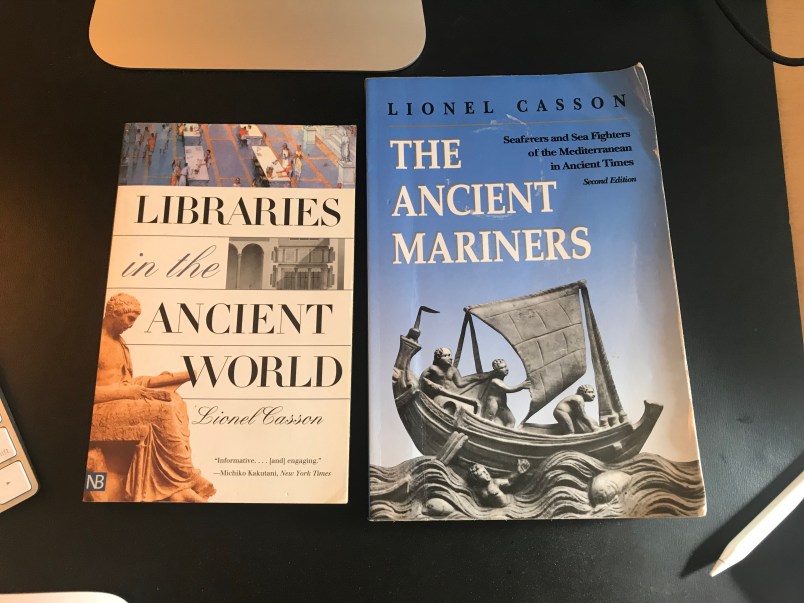Some books seem wildly obscure but are a great delight to read. History books, I mean in this case. It’s always history books with me. So I’m going to recommend two right now. I thought of them because I decided I wanted to read them both again myself.
The books are The Ancient Mariners: Seafarers and Sea Fighters of the Mediterranean in Ancient Times and Libraries in the Ancient World. They are both by Lionel Casson, a classical historian who focused primarily on maritime history but also ranged further afield and mixed traditional literary sources with a deep reliance on the archeological record (particularly maritime archeology) which has transformed classical studies in the last half century. Casson died at 94 in 2009 and published the libraries book in 2001.
I learned two new things about Casson when I was writing this post. From what I can tell he entered NYU in 1929. He graduated in 1934, went on to get a Masters and Phd. He then became and instructor there and taught there, with some interruptions for the rest of his life. He was born Lionel Cohen.
What is it about these two books (and I suspect his other works, which I haven’t read)? There’s no one thing I can point to. They are simply richly learned and informative and a delightful read. As you do when you read any quality work of history, you find yourself in a new world. It probably helps to have some interest in the ancient world to find these books engaging. But I don’t think that’s necessary.
How did ancient libraries work? What was their architectural make up? What were the unique challenges of storing a civilizational literature on scrolls rather than the simply far more functional codex (what we call a ‘book’) which succeeded it in the Christian era? Quality in writing, and especially in history, is a matter of detail. These books overflow with it.
The libraries book was a late career, late life project, from what I can tell. It wasn’t his specialty, which as I noted was maritime history. He writes this in the preface: “This book is the first full-scale study of libraries in the ancient world. It presents whatever is known about them from their debut in the ancient Near East in the third millennium B.C. down to the early Byzantine period, the fourth and fifth centuries A.D., when the spread of Christianity and of monasticism fundamentally changed the course of library history.”
How could this be first full-scale study of this topic? That’s amazing.
The mariners book is more encyclopedic books; it’s longer. The sheer complexity of the topic is fascinating – from the structure, naval architecture and manning of warships to the highly technologically and commercially complex world of Mediterranean shipping during the Roman empire – maps, navigation, the evolution of different kinds of sailing vessels, the need for ‘coasting’ rather than out of sight of land navigation. It’s all in there.






